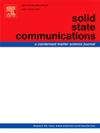从第一原理研究看氧在增强掺铁 MoSi2N4 单层磁性中的作用
IF 2.1
4区 物理与天体物理
Q3 PHYSICS, CONDENSED MATTER
引用次数: 0
摘要
MoSi2N4 是一种新型的二维层状材料,它是一种半导体材料,具有新颖的谷物物理特性和优异的稳定性,这表明它在谷物电子学和自旋电子学领域有着巨大的应用前景。本研究基于第一性原理研究了不同掺杂模型 MoSi2N4 的自旋极化电子结构和磁性能。结果表明,Fe 掺杂呈现出半金属带状结构,诱导出 4.01 μB 的总磁矩。对于 Fe + O 共掺配置,进一步引入 O 原子会将总磁矩增加到 5.0 μB。磁矩主要来源于 Fe-3d 和 O-2p 以及 Mo-4d 和 O-2p 的耦合。然后,计算表明,Fe + O + Fe 共掺杂构型的稳定性增强,并表现出反铁磁性秩序,总磁矩约为 0.98 μB。由于反铁磁相互作用,磁矩主要来自于 Mo-4d 和 O-2p 态的杂化,并出现了从半金属到金属的带状结构转变。本文章由计算机程序翻译,如有差异,请以英文原文为准。
Role of oxygen in enhancing magnetism of Fe-doped MoSi2N4 monolayer from first-principles study
MoSi2N4 is a new type of two-dimensional layered material, which is semiconducting with novel valley-physics properties and excellent stability, suggesting its great applications in the field of valleytronics and spintronics. In present work, the spin-polarized electronic structure and magnetic properties of different doping models of MoSi2N4 are investigated based on first principles. The results show that Fe doping presents a semi-metallic band structure, inducing a total magnetic moment of 4.01 μB. For Fe + O co-doping configuration, further introduction of the O atom increases the total magnetic moment to 5.0 μB. The magnetic moments mainly originate from the coupling of Fe-3d and O-2p and Mo-4d and O-2p. Then, the calculations show that the stability of Fe + O + Fe co-doping configuration is enhanced and exhibits antiferromagnetic order with a total magnetic moment of about 0.98 μB. Due to the antiferromagnetic interaction, the magnetic moment is mainly derived from the hybridization of Mo-4d and O-2p states, and a transition from semi-metallic to metallic band structure is observed.
求助全文
通过发布文献求助,成功后即可免费获取论文全文。
去求助
来源期刊

Solid State Communications
物理-物理:凝聚态物理
CiteScore
3.40
自引率
4.80%
发文量
287
审稿时长
51 days
期刊介绍:
Solid State Communications is an international medium for the publication of short communications and original research articles on significant developments in condensed matter science, giving scientists immediate access to important, recently completed work. The journal publishes original experimental and theoretical research on the physical and chemical properties of solids and other condensed systems and also on their preparation. The submission of manuscripts reporting research on the basic physics of materials science and devices, as well as of state-of-the-art microstructures and nanostructures, is encouraged.
A coherent quantitative treatment emphasizing new physics is expected rather than a simple accumulation of experimental data. Consistent with these aims, the short communications should be kept concise and short, usually not longer than six printed pages. The number of figures and tables should also be kept to a minimum. Solid State Communications now also welcomes original research articles without length restrictions.
The Fast-Track section of Solid State Communications is the venue for very rapid publication of short communications on significant developments in condensed matter science. The goal is to offer the broad condensed matter community quick and immediate access to publish recently completed papers in research areas that are rapidly evolving and in which there are developments with great potential impact.
 求助内容:
求助内容: 应助结果提醒方式:
应助结果提醒方式:


